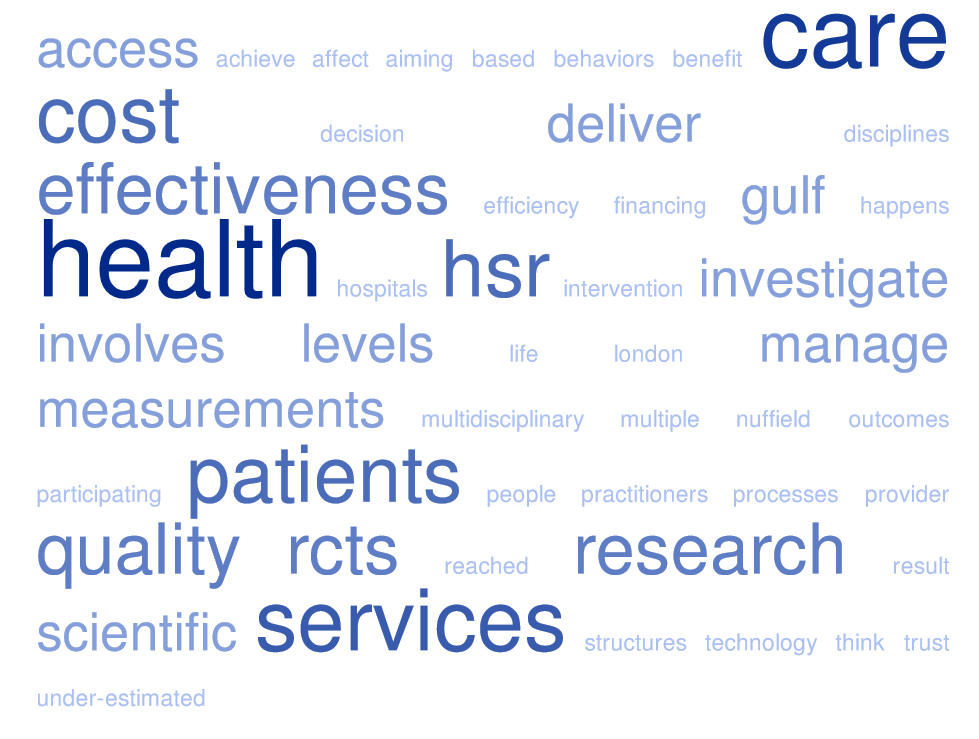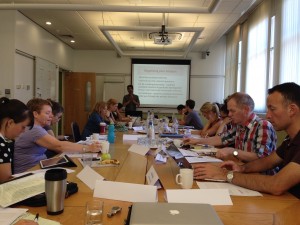So, what is health services research?
Back in March I emailed colleagues to find out how they would define health services research. I’d posted a link to a recent Hive Blog to my facebook page, and whilst my friends were understandably incredibly impressed with how erudite and cleverly I made connections between Taylor Swift songs and realist synthesis, they were also at a bit of a loss about what kind of research I do… this was the second time that someone had asked me to more closely define a) what is HSR, as well as b) realist approaches in a nugget/nutshell, so I thought it was about time I wrote something.
I had some great responses from colleagues (see the word cloud!), and here are some of the highlights – starting in the plainest of English, travelling to the kinds of definitions which I think need further translation and explanation…
Thinking wisely, asking questions and weighing the evidence in order to understand and help decision making by those that work in health and care services.
We look at things like how people access health and what treatments they may receive and how access, treatment and practices could be better in terms of costs, how effective they are, how accessible they are and how to make them actually happen in the real world.
The use of systematic methods to understand the workings of an aspect of health services, how such health services deliver health-related and other outcomes and how such services may be altered to improve the delivery of such outcomes
What is HSR? I’ve always wondered… and for a long time I had absoluuutley no idea and just hoped no-one would ask me… to be honest none of my daily out-of-work acquaintances have the even remotest idea what I do apart from be Betty and Danny’s Mummy and that I drive off to work in that far off land what is The University so something like ‘it’s research about health services kind of thing innit?’ is usually enough to get the glazed look and realise that you’ve said enough! I feel a bit more grown up now (since they put Senior in my title) and like I should have a better answer… but maybe the simple is always better – this is a bit text book-eze. How about – ‘HSR involves researchers from multiple disciplines aiming to find out the best ways to deliver, manage and organise the most effective and cost-effective health services and improve the quality of care.’?
Health Service Research involves “informing the decision on how to deliver the Right intervention, at the Right time to the Right Patient, in the Right location, by the Right provider, with the Right Outcomes for the Right cost “
The integration of epidemiologic, sociological, economic and other analytic sciences in the study of health services. Health services research is usually concerned with relationships between NEED, DEMAND, supply, use, and OUTCOME of health services. The aim of health services research is evaluation: several components of evaluative health services research are distinguished, viz: Evaluation of structure…., of process…., of output…., of outcome….
Health services research is a multidisciplinary field of inquiry, both basic and applied, that examines the use, costs, quality, accessibility, delivery, organisation, financing, and outcomes of health care services to increase knowledge and understanding of the structure, processes, and effects of health services for individuals and populations.
So what about you? If you’re down the pub talking to friends (or strangers….), and somebody asks you what you do, what do you say HSR is?
[Obliquely opaque film reference alert… Scarlett Johanson’s recent role as an alien in Under the Skin is creepy and compelling. I particularly like how she approaches asking people about themselves…. so maybe just be wary if someone follows up asking you about HSR, by asking you if you live alone…..]


